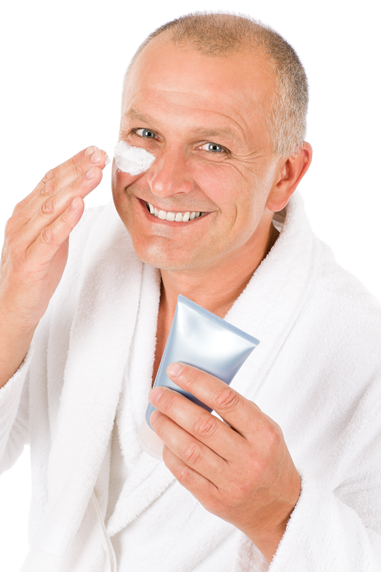
It’s no secret that our skin changes progressively with age. It becomes thinner, loses fat, and no longer looks as plump and smooth as it once did. Not only does the appearance of the skin change, it can also take longer for abrasions, bruises, and cuts to heal. The skin becomes more susceptible to dryness, age spots and skin cancer as we get older as well.
If you are a caregiver for a person with Alzheimer’s disease (AD), you may notice signs of aging skin in your loved one such as dry, irritated, or itchy skin. Here are some tips to ensure healthy skincare for seniors and those with AD:
Dry Itchy Skin
Humidifiers work wonders for dry skin, particularly in the winter months. In the summer, avoid over exposure to the sun and be sure to offer adequate fluids to your loved one to ensure hydration. Avoid harsh soaps and really hot water during the bath, try to find a soap product that is free of sodium lauryl sulfate which can cause dryness and skin irritation. Use natural moisturizing products daily-avoid products high in chemicals and added artificial scents which could increase skin sensitivity and irritation. Keep in mind that dry skin could be a sign of a medical condition such as diabetes or worsening of conditions such as kidney disease so be sure to report signs of dry skin to the attending physician.
If your loved one with AD frequently scratches itchy skin, it could lead to open wounds and bleeding, resulting in infection risk. Therefore, it’s vital to address dry skin and use preventative measures before such complications occur.
Bruising
Elderly people usually bruise easier than younger individuals because the skin becomes thinner as we age and we lose some of the protective fatty layer. Keep in mind that frequent bruising can be a sign of serious health issues, such as problems with normal blood clotting mechanisms. Be sure to report signs of unexplained or excessive bruising to the attending physician.
Skin Tags
Skin tags are small growths (usually the same color as flesh) that commonly occur on the neck, armpits, and other folds of the body; they are normally harmless. As we age skin tags become more prevalent but they can cause irritation when they rub against other skin surfaces or clothing. If your loved one has a skin tag that looks irritated or causes pain, it should be reported to the attending physician. Skin tags can usually be easily removed.
Skin Care for Bed-bound Individuals
If your loved one is bed-bound your skin care efforts need to be intensified. Frequent turning and meticulous cleanliness are vital to maintaining healthy skin for those with impaired mobility. Keep in mind that nutrition can dramatically affect skin health. To learn more about Alzheimer’s caregiving, the Alzheimer’s diet, and prevention and treatment Join AlzU.org Today.






